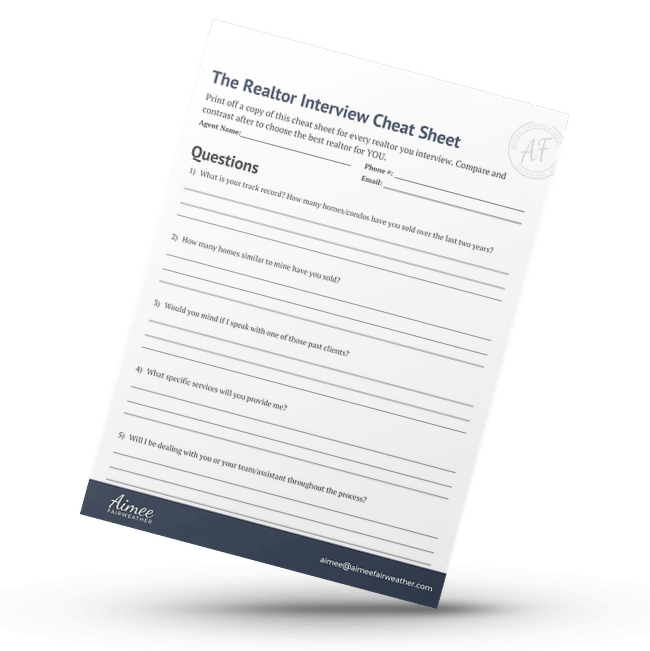Introduction
The Ultimate
Toronto Home Seller's Guide
Good news: you don’t have to be a real estate mogul to get to top dollar for your home. You just need to understand how the process works…
This guide is full of insights and strategy that will help you sell for the highest price, in the least amount of time.
Disclaimer
This guide should not be used to sell a home on your own. I would never recommend anyone to sell property without consulting a licensed Realtor and their lawyer.
Any advice here within is meant to supplement the guidance and knowledge of a licensed real estate agent when you are ready to take the next step.
In this Guide You'll Learn:
I’ve ordered these chapters in a logical progression of the home sale process. It isn’t perfect because everyone’s experience will be different, but I think it does a pretty good job.
Feel free to skip ahead to the chapters that serve your current needs, but I would recommend reading them in order if time permits.
Choosing When to Sell
How do I know if I'm ready to sell? When is the best time of year to sell? Should I buy or sell first? Answers to these and more.
The Costs of Selling
It takes money to make money. To get top market value for your home in less time you need to be willing to invest time and dollars.
Working with a Realtor
I'll tell you when you should reach out, how to choose one, what you should expect from them, and how you can work with them.
Price Your Home to Sell
How do Realtors come up with prices anyways? It is a multi step process that can make or break your sale. You don't want to skip this one.
Creating Buyer Desire
It' all about attention, standing out from the crowd. I'll show you how to make your home pop so that buyers will be banging down the door!
Maximizing Buyer Turnout
Learn what a modern marketing plan looks like, and how it will maximize buyer turnout for your listing (and sale price).
Going on the Market
There are different ways to list your home, and a lot of things you need to make sure your doing to make buyers happy.
Everything About Offers
Having an expert by your side invaluable. Negotiations, offer types, strategy and what to do if your house just won't sell!
After Accepting the Offer
Until the lawyers give the all clear, hold off on the champagne... Probably the shortest chapter, but it's an important one.

Who am I?
About Aimee
Fairweather
Hi, I’m Aimee — a Toronto Realtor with a passion for everyday people navigate the Toronto Real Estate market.
I believe an educated homeowner has a better chance of maximizing their home sale value, which is why I put together this comprehensive guide. I hope it can help you in some small way.
Chapter 1
Choosing
When to Sell
When is the best time to sell my home?
This is a very common question.
Just like with investing in the stock market, trying to time the Real Estate Market is a quick way to indecision, regret and inaction. So don’t let what you see on the news pressure you into making any hasty decisions.
This chapter will help you make an educated decision on when the best time to sell will be for YOU.
Table of Contents
Are You Ready to Sell?
This is a loaded question.
There are so many reasons that someone might want to sell a home that it’s almost impossible to give you a reasonable answer without talking to you first. But unless there are huge life events like
- Marriage
- Having a child
- A job transfer
- etc.
It is most likely that you will be contemplating whether to sell or not for at least a few months — maybe even a year or more.
And this is actually a GOOD thing. Selling a home takes a lot of time and effort, and generally speaking, the more time you have to prepare — the better.
Again, the key is not to try and time the market. People are always buying and selling homes. If you have the luxury of choice, fill in the gaps in your knowledge and you will know when you are ready.
The Best Time of Year to Sell
"When is the best time of year to sell my home in Toronto?!"
- Someone, somewhere, probably just now...
This question inevitably comes up with the majority of people looking to sell their home. But it takes us back to the topic of trying to “time” the market. I want to emphasize again that this is a BAD idea.
I am not saying that you can’t improve your chances of success by understanding historical trends in the Toronto real estate market.
What I’m saying is that there are other factors in the sale of the home that we have more control over that we should concentrating on.
That being said the real best time to sell is when buyers are active and buying homes.
Simple supply and demand.
And I will tell you from working on the front lines the last few years, Toronto has demand year round.
A common misconception people have is that because houses look more inviting in the summer with their beautiful gardens and shimmering pools (wouldn’t that be nice…) — that this is a great time to showcase and sell.
But is this actually when most buyers are active?
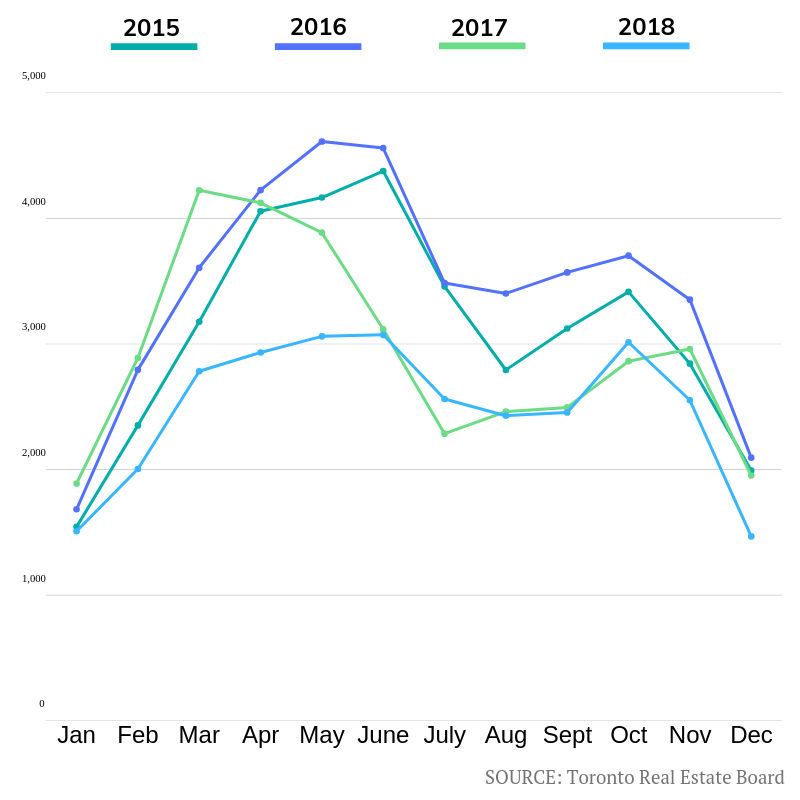
Looking at the chart above, you can see that over the last 5 years, sales tend to peak at the tail end of the winter (February – March), and throughout spring (April – June). After that, sales have dipped a bit, but stayed strong throughout the summer and fall, and only really fallen off over the holidays.
Recency bias says that March to June is the most likely time that buyers will be most active, but the market is still very active throughout the entire year.
This lines up with the idea of Toronto’s traditionally accepted Spring and Fall markets, however, for a desirableand well marketed property, there is a lot of opportunity for high prices at any time of the year (except the holidays, avoid those). 🙂
In short, if you…
- Prepare yourself
- Prepare your home properly
- Understand your personal goals and
- Set your financial goals
Timing won’t be as much of a factor.
Should I Buy First or Sell First?
First off, this is a great problem to have. There are so many hopeful homeowners out there right now that would love to be in your shoes. Take a second and appreciate what an accomplishment it is to own a home…I think we could all do with a little more gratitude in our lives.
Ok, ok, back to the question at hand. To buy first or sell first? Let’s look at two scenarios.
Scenario 1
I buy a home before I sell my current one. I am anxious that I won’t be able to sell my current one, and I am not sure if I can sell it for enough.
Scenario 2
I sold my house and know how much money I have to work with. But the market is crazy competitive and I don’t know if I will find the right house before my current one closes!
This “chicken or the egg” dilemma can be taxing on the brain. To make this decision easier—ask yourself this question…
In the current market, would it be more difficult for me to find and buy a new home that fulfills my needs or to sell my home?
Do whichever one will be more difficult first.
PRO TIP
Whatever you decide, the key is to try and time it so that you buy and sell in the same market.
Selling now and waiting a long time to buy to see what the market does risks seeing the price of your ideal property going up and out of budget.
Buying now and trying to sell much later also presents a risk. Home values could go down and you could be in a sticky financial situation with your new mortgage.
Let’s take a quick look at the advantages and disadvantages of selling or buying first.
Selling First
HINT: Try for a longer close if you can. This reduces the likelihood of running into any of the disadvantage scenarios.
Buying First
HINT: Try for a longer close if you can and use a realistic budget as the theoretical selling price of your current home. This reduces the likelihood of running into any of the disadvantage scenarios.
Key Takeaways:
- Don’t try and time the market. People are buying homes all year long. Unless there are external pressures, sell when you’re ready.
- If you’re buying and selling make sure you do it in the same market. Do the one that will be hardest first.
- Try for long closes as they decrease the likelihood of issues when deciding whether to buy or sell first.
You’re real estate agent will be able to give you sound guidance and advice on all of these topics. In the next chapter we’ll highlight costs you need to be aware of when selling your home so you can budget accordingly.
Chapter 2
The Costs of
Selling Your Home
There are costs involved before and after you sell your home (especially if you want top market value).
I will challenge you here to look at many of the following costs as investments instead. Why?
Because if you put your money in the right places, they should net a positive return on the final sale price of your home.
Home Repairs
While do I go over home repairs in more detail in Chapter 4, I just wanted to quickly mention home repair here. To achieve top market value for your home you may want to do some major or minor repairs before going to market.
This is where giving yourself a solid time-frame to prepare your home becomes invaluable. These can range in the hundreds to thousands of dollars.
You don’t want to go overboard with home repairs, and should only consider those that will increase your homes immediate value.
Consulting with your Realtor on which repairs you should prioritize to help your bottom line is a good move before starting any work.
Staging
I do a complete breakdown about the value of staging in Chapter 4, but just wanted to give a quick overview here.
Staging fees come in two parts.
- A consultation fee that costs a few hundred dollars.
- Furniture rental fee that often amounts to a few thousand dollars a month.
Rental fees will vary based on the number of pieces you are renting (the larger the home the higher the cost is a good rule of thumb).
Some stagers will apply the consultation fee to the furniture rental if you decide to move forward.
I have yet to come across a scenario where I thought staging wouldn’t help obtain a higher offer. If you have an opinion about staging I would love to hear about it in the comments below.
Professional Photography/Video
Investment: ~$400 – $1200 (depends on home)
SOURCE: National Association of Realtors, 2018 Profile of Home Buyers and Sellers
95% of buyers start their home search online and half of all buyers find the home they buy online.
Photos of beautiful homes are what grab buyers attention.
If you don’t have eye-catching professional photos, walkthrough videos or a virtual tour of your beautifully staged home, you are leaving money on the table.
Professional photos cost only a few hundred dollars, but are well worth the investment.
Home Inspector/Pre-Inspection Report
Investment: $400 – $600
You may want to consider having your home inspected before putting it on the market. Taking this action has two benefits.
- Gives reassurance to buyers that are thinking of making an offer
- Potential to point out repairs you should make before going to market
Status Certificate (Condos)
Investment: $100 – $150
If you are selling a condominium you may want to consider obtaining a status certificate before you go to market. They provide buyers with important information about the condo and its management. These include financial health, bylaws, regulations and more.
Providing buyers with a recent status certificate has two immediate advantages
- Allows your Realtor to identify red flags that may affect sale price/desirability
- Removes conditional offers based on the review of the status certificate (better offers)
Penalty for Early Discharge of Mortgage
If you still have a mortgage when you sell you may incur a penalty for discharging (paying off in full) your mortgage earlier than the terms of your mortgage dictates.
Talk to your mortgage broker or bank to understand what these fees will cost and how to avoid them when possible!
Lawyer Fees
Both buyers and sellers need a lawyer to act on their behalf in any real estate transaction. Selling your home has lower legal fees (usually around $1,000) than buying a home.
Brokerage Fees
In most circumstances the seller pays the fees of both the buyer’s and seller’s real estate agent. This fee is typically based on a percentage of the selling price of the property.
Usually 50% of the total commission goes to the Realtor who listed your home, and 50% goes to the co-operating (buyers) Realtor.
Moving Costs
I don’t know how much stuff you have, or how big your space is. This could costs hundreds to thousands of dollars, so it may be worth getting some quotes months in advance of moving.
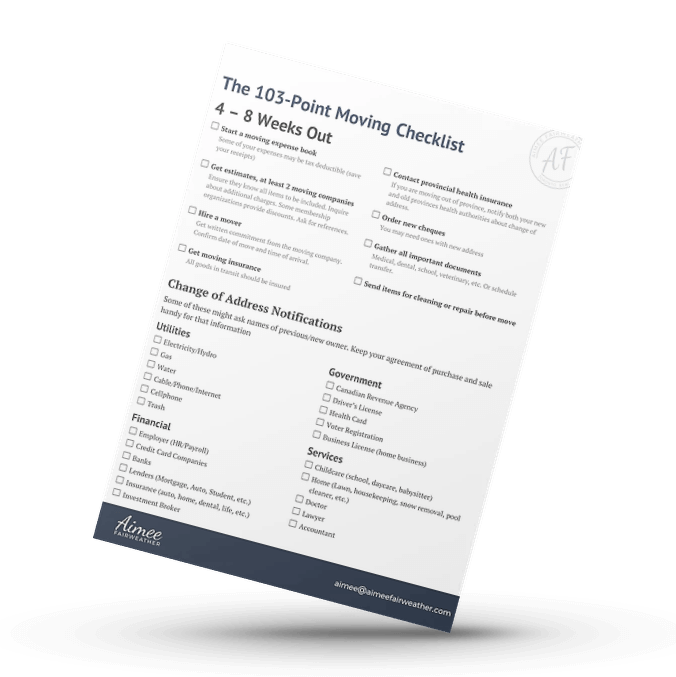
Get the 103-Point Moving Checklist!
Eliminate the disorganization and anxiety...
- Stay on top of everything and everyone during your move
- Tonnes of tips for packing, storage and prep
Capital Gains Tax
If you are selling your primary residence, you won’t pay any capital gains tax in Canada. If on the other hand your are selling an investment property, you could very well be subject to this tax.
Your accountant will be able to answer that question in detail.
Key Takeaways:
- Be aware of and consider costs associated with selling when calculating your budget for your next purchase.
- Invest in your home sale. Though staging, photography, etc. are optional, they will help you get a better return.
- Consult your realtor. Some investments will have a better return than others. Your realtor will be able to assess your unique situation and guide you where to spend your money and what to avoid.
Speaking of Realtors…in the next chapter I am going to walk you through what it looks like to work with one, and how to pick the right one for you!
Chapter 3
Working
With a Realtor
85% of home sellers used an agent or broker to help them sell their home.
-Zillow Group, 2018 Consumer Housing Trends Report, NAR 2018 Profile of Home Buyers an Sellers
The purpose of this chapter is not to convince you that you need a Real Estate Agent.
If in reading the rest of this chapter and guide you do not see the value that we bring to the table, I respect your decisions and truly wish you success in the sale of your home.
Whether your looking for a real estate agent, or already have one, you will find helpful advice in this chapter.
When Is The Right Time to Start Talking to Real Estate Agents?
Reaching out to a Realtor does not need to wait until you are just about to purchase or sell your home.
In fact, you will find it a common desire among quality Realtors to establish long-term relationships/partnerships with you well before you have thought about taking any action.
As I mentioned in the previous chapter, the more time you have to prepare the better. Here are a few things a Realtor could help advise on or answer well in advance.
- What home improvements will give me the best/worst ROI?
- What paint colors are trending right now?
- Advice on renovations or extensions you may be thinking of investing in
- Sale and list prices of similar homes in your neighbourhood
- Monitor your investment by asking for an updated analysis of your homes value
- Provide a long term plan if you are thinking of selling in the next few years
- Advise on the best strategy and timing to list your home to maximize ROI
Honestly, I love talking about Real Estate, so any time I get to “nerd out” over it I am happy to give advice and updates about the market or just talk shop.
You should NEVER feel obligated to put your house on the market before you are ready (barring that there are no external pressures as mentioned in Chapter 2).
Meeting Real Estate Agents
Just like in any other professional business, there are varying levels of expertise, experience, personalities and strategies you will find among real estate agents.
Diversity is important, because although one realtor may be a perfect match for you it may not be the case for someone else.
Your realtor’s role will extend beyond just selling your home. They are your strategic partner, counselor, guide and they will be going to battle on your behalf during negotiations.
You don’t have to be best friends with them — however, it is important you feel comfortable around them, trust their advice, have confidence in them/their abilities and have mutual respect for one another.
You will, after all, be talking and meeting a fair amount throughout the process.
If you are having trouble finding a Realtor here are some ideas to help you out.
Referrals
Talk to friends, family or anyone you might know that recently bought or sold a home. Ask them about their experience and if they would recommend their agent
Community
Have you noticed any agents active in your area or seen them online? Google them, check out their testimonials and reviews. Does anything about them peak your interest?
Online
Use Google, Yelp, Zillow, Facebook or any other platform you can think of to find an agent. Do your research and keep notes of the ones you might want to talk to. Be aware of how they market themselves…it’s telling of how they will market your home.
Open House
Check out open houses in your neighbourhood and meet some of the agents hosting them. Nothing better than meeting someone in person to see how they work and communicate.
Using a Close Friend or Relative
Selling a home is a serious business transaction. There is a lot of money on the line and emotions can run high.
When you have a friend or family member that is a real estate agent, it can often be a case of “your damned if you do, damned if you don’t”.
Depending on how thick their skin is, this person may be offended if you don’t use them to sell your home. Only you can answer if you think they are the right person for the job.
I can’t say what the best course of action is for your situation, but I can give you some food for thought.
When conflicts or issues arise, it is often easier to objectively confront an unrelated professional than it is someone that you have a close relationship with.
On the other hand, you will find that a friend or family member might work even harder for you and could be an amazing choice.
You need to take a step back and do the best you can to objectively compare their abilities, and track record against other professionals you may be considering.
You only get one shot to sell your home, so you should carefully consider who is the best person attain the highest price.
The next few sections will help you identify who that person is.
What You Should Look for in a Realtor
Quality Realtors do not just put up a sign, load a property on MLS and help you with paperwork. Good realtors are strategic partners who counsel you and work hard to minimize stress that inevitably arises during the selling process.
Yes — you should expect services like advice on staging, photography, digital marketing, open houses, etc., to bring in tonnes of eager buyers. These are extremely important to the successful sale of a home (which is why I go into each of them in detail in later chapters).
For right now, I really want to focus on professional characteristics, values and business practices that you should look for in a realtor that are going to make your experience as stress free and enjoyable as possible.
Altruistic
Your Realtor should put your interests and well-being first in any actions or recommendations they make around the sale of your home.
Honest
Realtors have a legal obligation to tell you the truth whether good or bad. This includes feedback about what buyers thought about your home.
Ethical
If something feels “Shady” it usually is. Good realtors abide by a strict code of ethics and treat everyone involved in the transaction fairly and with respect.
Clear Communicator
Your realtor should be open to communicating with you however you prefer. In person, phone, e-mail, text or walkie talkie (if that’s your preference). There should be updates and progress reports on an agreed upon schedule.
Accessible
You should always be well informed about what is happening with the sale of your home and in your local market. If you have questions, you should never feel like you need to be chasing them around for information.
Dedicated
You should expect your realtor to work diligently and consistently until your home is sold.
Accountable
Sometimes, properties just don’t sell. Your realtor should be able to clearly explain the reasons why it may not be selling and provide recommendations about how the strategy might be adjusted.
Professional
You should expect your realtor to act professional in all their business dealings. It’s great if you can enjoy your time with them and have fun, life is too short! But time and a place right?
Negotiation Expertise
Your realtor should be able to get offers on the table from potential buyers, negotiate conditions and a price that are in your best interest and adjust their strategy as the negotiations play out.
Transparent Pricing
When your realtor prices your home, they should be able to clearly justify their reasoning. Don’t fall for the one with highest quoted price, make sure they can back it up.
They should be able to explain different pricing strategies, and guide you to the one which is most likely to succeed in your local market.
Reputation
A good reputation and relationship with other realtors is important. They should have a system for reaching out to industry contacts and brokerages about your property.
These connections will be invaluable in the sale of your home.
When meeting and speaking with realtors, keep these items in the back of your mind and I guarantee you will find the right fit for YOU.
How to Work with Your Realtor for a Better Experience
In order for your realtor to get you the best results they will need your help along the way.
I can’t stress the importance of your cooperation and communication enough.
Be honest about your motivation to sell your house.
Fully disclose any important information about the property. Upgrades, monthly costs, structural defects like pests, leaks, etc. The more information your Realtor is armed with the better.
Communicate your expectations clearly. This includes timing and financial expectations for the sale. If these change during the process, you need to let your Realtor know.
Listen to your Realtor. Ultimately you are the decision maker. Listen to their advice so that you can make informed decisions.
Have thick skin when it comes to buyers concerns about your home. Willingness to address these issues or adjust expectations is important to stay level headed.
Confront your Realtor if you are unhappy with something they are doing. There is no way for them to fix the problem if they don’t know one exists. Remember communication is key.
Keep your home clean throughout the selling process. Nothing turns off buyers like a messy, cluttered home.
Flexibility for showings and open houses will allow more buyers to see the home. Try and accommodate them all if possible.
Get out of the house during showings. It can make buyers uncomfortable if you are around.
Get your pets out of the home during showings. Some people have allergies or are uncomfortable around certain types of animals — this also goes back to keeping it clean.
If you can stick to this list, your Realtor will be very appreciative and the sale of your home will go much, much smoother.
Key Takeaways:
I hope that this chapter gave you some ideas on finding the perfect real estate agent for YOU.
- Reach out to realtors well in advance of selling. They can give you long-term advice that will have you way ahead of the game when you do decide to sell.
- Use all resources available to find potential agents. There are over 50,000 agents in Toronto. There will be a perfect match for you.
- Don’t forget character traits. There is more to a good realtor than numbers.
- Work with your agent for success. Communication and cooperation are key.
Now that you have an idea of how to find an agent that will give you the best chance for success, let’s get into the fun stuff…
The next chapter is all about pricing.
Chapter 4
Pricing
Your Home to Sell
In the current state of the Toronto real estate market, the hard truth is that your home is worth what a buyer is willing to pay.
That being said — determining the fair market value of your home is the foundation upon which your pricing strategy will be built. Putting you in a position to influence what the market will pay.
Determining Your Home’s Market Value
There are 3 primary authorities you can look to in order to understand the fair market value of your home.
1 — City of Toronto Evaluation
The city performs a Current Value Assessment (CVA) on every residential property in Toronto.
The CVA is used as part of determining property tax. Since we live in a free market, it is very unlikely that this CVA will be anywhere close to what your home will sell for.
Think of it more as a starting point for determining fair market value.
2 — Professional Appraisal
You can hire a professional appraiser to value your home. Banks hire them prior to placing a mortgage on a property.
Since appraisers charge a fee for their services you would think they would be making an informed, unbiased evaluation.
It is important to note that these appraisals are often conservative. It is in the appraisers legal interest to be able to substantiate their assessment in court.
3 — Realtor Appraisal
I may be biased here, but a realtor will likely be the best tool you can use to determine fair market value.
Realtors will use their local market knowledge and research to estimate the value of your home. Every Realtor will form their own opinion of what price they think a property could obtain if it was currently on the market.
This is a learned skill. Some realtors are better at it than others, especially when it comes to specific Toronto neighbourhoods.
Do not choose your realtor based on the one that gives you the highest price estimate. This is a tactic some will use to try and get your listing. They should be able to clearly explain and justify their valuation (see Chapter 2).
It is in your best interest to get a few quotes, just like if you were going to hire someone to fix your electrical or renovate your home.
Choose a realtor based on their marketing strategy and professionalism rather than an unsupported and optimistically high assessment.
Pricing Your Home Effectively
The initial list price is arguably the most important factor in achieving top market value on the sale of your property.
Buyers will be viewing a lot of homes with their agents before making an offer. They will no doubt become well versed with what is happening in the marketplace
Combining their new found knowledge, with the market experience of their realtor — buyers will know if your listing is priced appropriately or way out of line.
The importance of setting the price right the first time can’t be understated. It can mean the difference between selling quickly — or languishing on the market for an extended period of time.
SOURCE: Zillow Group, 2018 Consumer Housing Trends Report
Of those 61%
- 31% had to change price twice
- 29% made 3+ changes
In most cases, even just 1 price change can have a significant negative impact on final sale price. Think of what 2 or more could mean to your bottom line…
The longer a house sits on the market, the more opportunity the buyers and their realtor will see. Instead of asking themselves
“How much they will have to pay to get the house?”
They will start asking
“How much of a discount can I get?”
Listing Too High
Not only will listing too high shrink the size of the buyer pool — it will make it difficult for buyers to see value. Your house may not compare well to other properties at that higher price point.
This can create the feeling that you have unreasonable expectations.
Why would they waste their time offering on your property when there are other properties listed at fair market value?
Savvy buyers and their realtors will know that it is listed to high, and might wait for a price reduction.
Listing Too Low
While going to Market with a list price significantly under market value has become a common marketing strategy in Toronto, it can also have its downfalls.
This can actually have the opposite of the desired effect and have buyers looking elsewhere for sellers that are treating buyers fairly.
If an offer that aligns with your target sale price doesn’t materialize, what next?
Having your home sit on the market, increase or change the price, or even having to re-list because you got it wrong the first time can have detrimental effects to the final sale price.
Pricing to Market Value
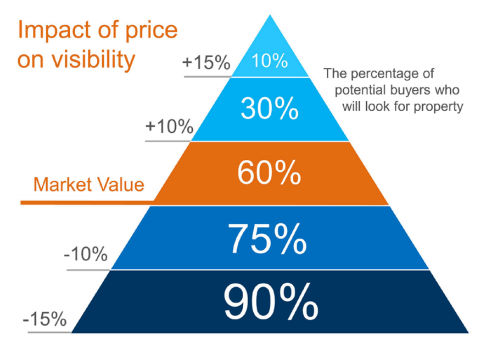
The above figure helps paint a picture of how price will affect the visibility of your home in buyers property searches.
The key factor being figuring out what market value really is.
EXAMPLE
You believe fair market value for your home is $600,000.
You decide to list 5% below market value at $570,000
Your understanding of true market value was wrong. It was $550,000. So you are really listing close to 5% above market value.
You just went from opening up the buyer pool, to significantly shrinking it because the initial assessment of market value was wrong.
It is very important that you have evidence to support your estimates of fair market value so that you can come to market at the right list price.
So how do you make sure to get it right the first time?
Comparative Market Analysis
A good real estate agent will conduct an in depth Comparative Market Analysis (CMA) that suggests an appropriate initial asking price for your home.
A CMA involves researching comparable homes in your area that have recently sold or are currently on the market taking into consideration factors like
Property Features
- Location
- Property and Lot Size
- Condition
Market Conditions
- Supply & Demand
- Interest rates
- Seasonal demand
Competition
- Price, location, features & condition
- Market activity
- Time on market
- Prices changes, expiries
A good realtor will know which factors are most relevant to your home, and how to ask the right questions to paint the best picture of its current market value.
How long were similar properties sitting on the market?
What were they priced at?
Were there multiple offers?
Were there any price reductions?
Was the property ever pulled off the market and re-listed?
Did the property have unique selling features that positioned it well in the marketplace?
Key Takeaways:
Be skeptical!
- The market decides the ultimate value of your home. There are no guarantees in this business.
- Get an appraisal from a licensed real estate agent.
- Listen to your realtor’s advice. The market doesn’t care how much you want for your home, and they know the market.
- Make sure market value is justified by a competitive market analysis. Realtors should be able to explain their estimates clearly.
- List price is relative to market value. Listing a little low is often your best bet.
Don’t just latch onto the highest assessment you might hear from a realtor. Prices should be clearly explained and justified. Otherwise you put yourself at risk of the downfalls of listing too low or too high.
In the next chapter, I am going to show you how to make your home stand out in the marketplace to bring in more eager buyers.
Chapter 5
Creating
Buyer Desire
Turnkey properties are all the rage in the Toronto right now. People want to be able to sign on the dotted line and move in.
The reality is that most homes will need at least some work. Buyers needs are just too different, and it is rare that a house is “perfect”, maybe even impossible…
But knowing that this is what many buyers are looking for, there are steps you can take to make your home very desirable for buyers.
Home Improvements to Think About
Now, which of the items below you will be able to do will inevitably come down to the time and budget you have available.
I, nor any other realtor for that matter, can guarantee a return on investment for any of these improvements.
The goal is to make your home more appealing to buyers, which should aid to increase the final sale price.
That being said, you should consult with your realtor about which ones to prioritize based on your time and budget.
Make a list — walk around the property with your real estate agent, and put together a list of potential improvements you can fit in within your timeline.
Work together to prioritize those that will have the highest impact. Here are some ideas to get started:
Interior
Bedrooms Should be Bedrooms
The number of bedrooms is one of the key search criteria people use to search for homes. If you have converted a bedroom into an office or den, switch it back before showings begin.
Kitchen & Bathrooms
Generally speaking, redoing the kitchen and/or bathrooms will have the greatest return on investment. Unfortunately they will probably also have the highest price tag.
If you don’t have the time or can’t afford a complete renovation, see if you can give them an update. Adding extra storage, a fresh coat of paint and fresh new towels are a great starting point.
Keep it Neutral
Update to more neutral decor for a cleaner modern look.
Paint
A fresh coat of paint goes a long way. White or something close to that will make it easy for buyers to update to whichever colour they prefer after purchase. White will also really brighten up a space.
Declutter and Organize
Less clutter will make the rooms in your homes feel larger and more appealing. It will make it easier for buyers to visualize their own furnishings in the home. This might include removing things from closets and shelves and adding organizers to make everything look like it is right where it should be.
Keep it Clean
Clean homes give the impression that their owners have maintained them well. They are more inviting and comfortable to be in as well. Don’t forget to shampoo the carpets and clean tiles and grout that may have mildew.
Fix What’s Broken
Appliances and light fixtures are usually included in a home sale. Buyers will be testing these so make sure you fix or replace any broken appliances or light fixtures. You may want to lean more towards replacement if they are dated and not energy-efficient.
De-personalize
Personal photos and family portraits may be meaningful to you, but it can make buyers feel like they are invading other people’s homes. We want them to picture themselves there, not you.
Exterior
These are more geared towards houses than condos, but some of these will apply to your balcony or terrace. First impressions are everything, don’t turn buyers off before they even walked in the door.
- Paint and/or power wash walls
- Fix or replace damaged lights, windows, fences or cracks in walkway
- Make the porch, front door or balcony look clean and inviting
- Make sure the locks and doors work (door shouldn’t stick)
- Hire a landscaper fix up the front and backyard
- Add fresh plants to front porch, front yard and backyard
- Make sure the lawn is mowed
- Fix the roof if it is damaged
You won’t and probably can’t do all of these.
Speak with your Realtor, prioritize and execute.
Start Preparing Your Home Early
"By failing to prepare, you prepare to fail."
- Ben Franklin
According to a 2018 study conducted by Zillow Group, the average seller spent about 7 months thinking about listing their home for sale.
25% of sellers said that they wished they started getting ready to sell their home earlier.
The reason I point these numbers out is to help you avoid regret!
If you are probably going to spend 7 months thinking about selling, why not start planning ahead?
In this same study, home sellers stated that decluttering was the #1 most difficult task.
Even if you don’t decide to sell, decluttering and cleaning your home will be of a benefit to you and your family. So why not do it now instead of stressing about it last minute?
Marie Kondo anyone? 🙂
Remember, a good real estate agent will want to build a relationship and give you advice long before you are ready to sell. Reach out to one and start making that list of potential improvements — you will be better off for it.
Tapping Into Emotion
"When dealing with people, remember you are not dealing with creatures of logic, but with creatures of emotion."
- Dale Carnegie
Buying a home is an emotional experience — but you know that, you’ve done it before!
As a seller, you and your Realtor need to be ever conscience of the fact that people buy more based on emotion than logic.
Just because a home is such a big purchase doesn’t mean it isn’t exempt from this phenomenon. In truth, it is probably more so.
A home purchase is unique in the fact that, yes, it is an investment. But it is also
- A roof over your head
- A place you watch your kids grow up
- Where you share memories with friends and family
- A tool for your retirement
And so much more…
Our job as realtors is to tell a story which allows buyers to picture themselves in your home. Enjoying the lifestyle they could have, the comfort. We want to make them feel relaxed, with a sense of security and happiness.
“What people want is the extra, the emotional bonus they get when they buy something they love.”
- Seth Godin
The rest chapter will cover the tools and strategies we can use to elicit such emotional responses in the marketplace.
Staging
There is no doubt that buyers have higher expectations than ever before. They see pictures and videos of beautiful homes all day long — scrolling through their Instagram and Facebook feeds, watching shows on YouTube and HGTV, reading home design magazines, etc.
77% of buyers said that staging a home made it easier to visualize a property as a future home.
SOURCE: National Association of Realtors, 2017 Profile of Home Staging
You don’t get a 2nd chance at 1st impressions, so you need to give yourself every chance to hit their expectations.
Think about it — when you see a stunning gourmet kitchen, a cozy living room where everything just fits perfectly, or a bedroom that just makes you want to curl up with a good book, you are picturing yourself enjoying those spaces.
That is the emotional side of buying — we are selling ideas and potential. Great home stagers know how to elicit emotions that generate excitement and create an experience that a buyer just can’t get out of their head.
The Numbers
Ok, ok so let’s get some numbers here.
According to the same 2017 study I mentioned above, the effects staging had on percentage of dollar value offered compared to similar unstaged homes were…
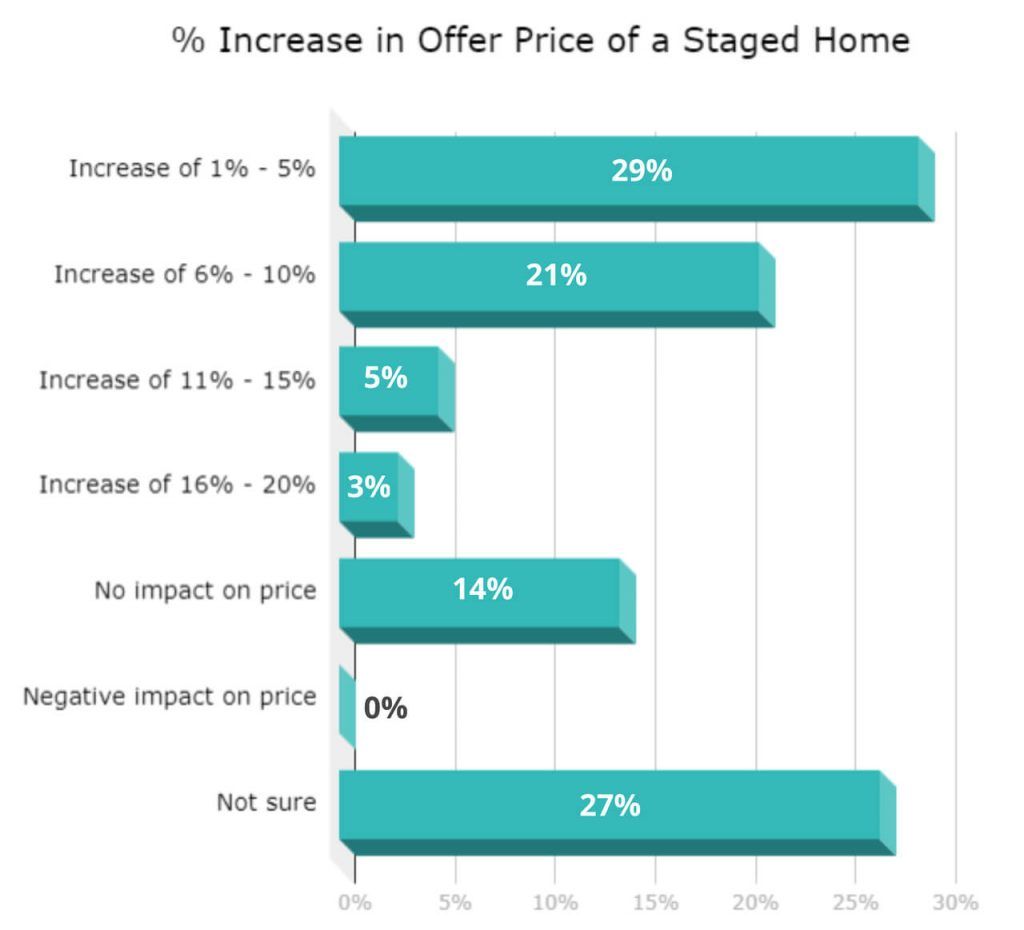
SOURCE: National Association of Realtors, 2017 Profile of Home Staging
I would like to emphasize that there was a 0% negative impact on the value of a home that is staged.
EXAMPLE
So let’s take property that has a $1,000,000 current market value as an example and look at the math.
- A 1% Increase in value would be $10,000.
- A 5% Increase in value would be $50,000
- A 10% Increase in value would be $100,000
- A 20% Increase in value would be $200,000
The cost of staging varies based on a few factors such as property size, amount of items to store, etc.
In my experience the average cost will run anywhere from $3,000 – $5,000 per month for a top level stager; this can of course vary depending on the size of your home.
So, looking from a risk to reward ratio, you are risking $3,000 – $5,000 with an almost 50% chance (it’s probably higher than that as I mentioned) to get a 2x (1% increase) to 40x (20% increase) on your money — in less than a month…
There is nowhere on the PLANET that you can get this type of return with such little risk.
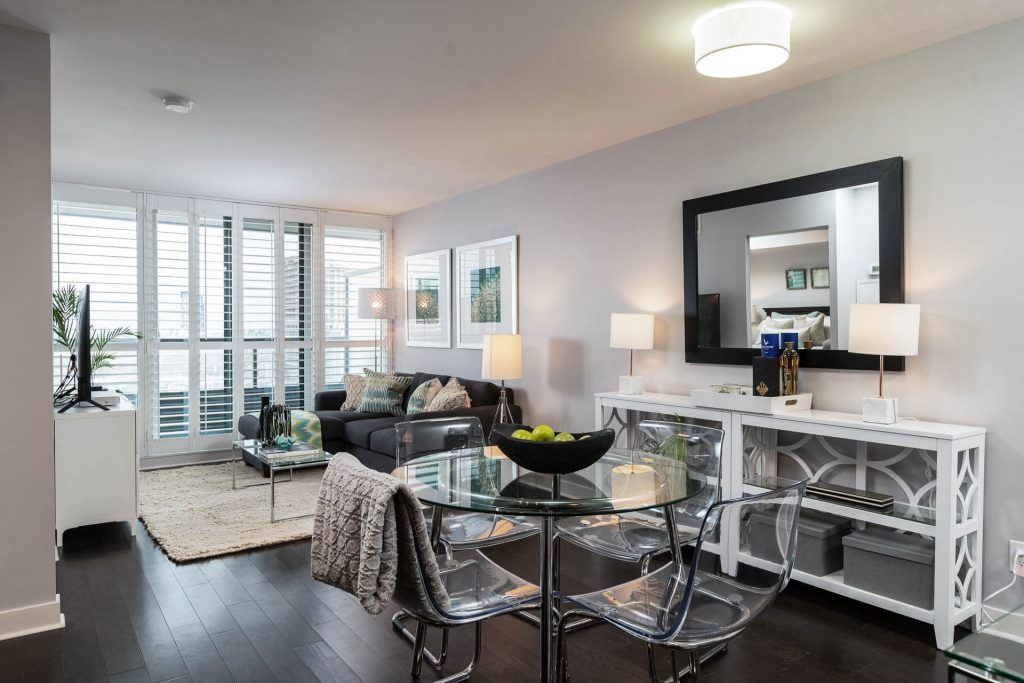
Just like a magazine…How inviting does that look?
Clean, with neutral colors and a modern feel that shows of the potential of the space.
If you take nothing else from this guide please, stage your home!
Hire a Professional Real Estate Photographer
Depending on the study you read, 90% to 95% of buyers start their search online.
It is therefore most likely that a potential buyer will find your property through an MLS Listing Search Portal like Condos.ca, Realtor.ca, Zillow or on Social Media.
Though a little dated a 2013, Wall Street Journal study found people spend about 60% of their time looking at a listings photos and only 20% on details, and 20% on agent remarks.
The same study found that 40% of people don’t do anything other than look at the photos!
This is from 2013. I think we can all agree that our attentions spans have plummeted even in the last five years.
What would you guess those numbers look like now?
On top of that 87% of buyers found that photos were the most valuable feature when looking for homes online (NAR, 2018 Profile of Home Buyers and Sellers).
So I think it’s clear that photos are important.
But when I say you should hire a professional real estate photographer, I am not talking about avoiding pictures like this.
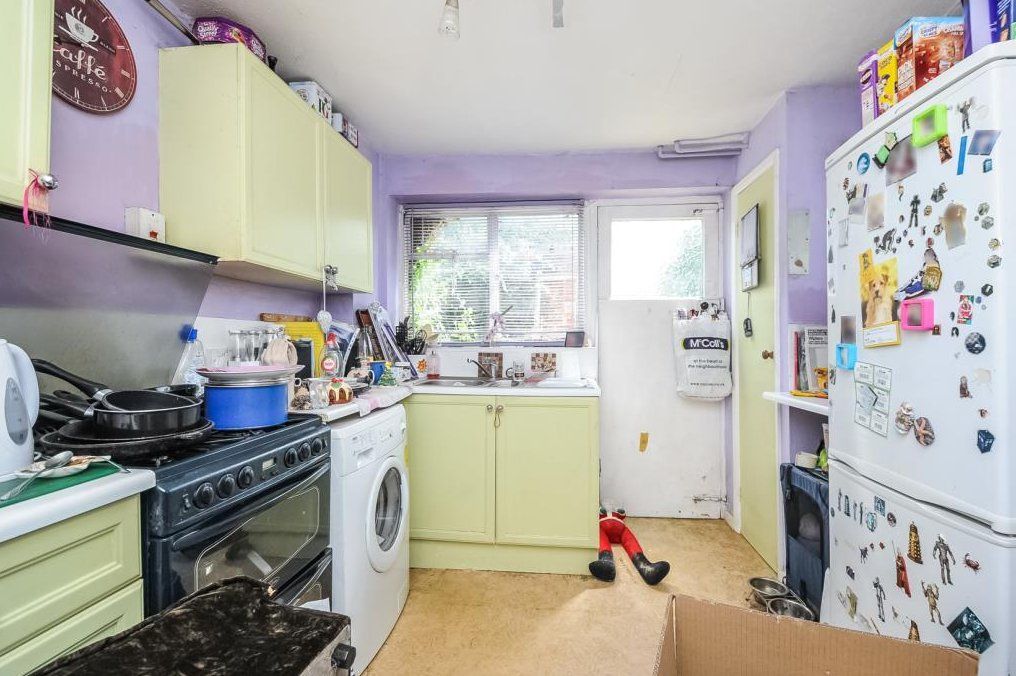
I think we all can agree that is a hideous photo…No one is going to want to buy that.
No, what I am referring to the is fact that there are professional photographers who specialize in Real Estate photography.
Take the following as an example:
Both photos are professionally shot, but photo B shows proper use of exposure for interior shots.
Obviously photo A is a little exaggerated, but I am just trying to get a point across.
Lots of professional photographers are masters of lighting, angles, post-processing and other photography stuff I know little about.
Real estate photographers specialize in shooting home interiors and exteriors to show them to their full potential.
Though any professional photography is a good idea, a real estate specialist will give them that extra pop.
Another quick example to hammer the point home…
Both photos here look great. Nice lighting, high quality. But photo B uses a much wider lense to capture the whole room.
Subtle, but it works!
For just a few hundred dollars, you can hire a professional real estate photography/videography company.
And if you took my advice and staged your home, why wouldn’t you want incredible photos to show it off?
I always invest my own money in professional photography for my clients homes, because I know it will produce a return for them.
Key Takeaways:
- Make a list with your realtor of potential home improvements.
- Prioritize based on time, budget and advice of your realtor.
- Start preparing as early as possible. Decluttering is a great place to start.
- Stage your home. It is a low risk, high reward investment.
- Hire a professional real estate photographer. You only get one first impression.
Now that your house looks incredible and we have the pictures to show it in all its glory, we need to bring it to the masses.
In the next chapter we will go over what a comprehensive marketing plan looks like, and how you can leverage one to have buyers beating down your door (hopefully not literally).
Chapter 6
Maximizing Buyer
Turnout on Offer Night
To attain top market value for your home, the journey doesn’t end at pricing, timing, preparation, staging and photography.
A quality Realtor will invest their time, money, experience and energy into marketing your home to get maximum exposure in the marketplace. Their marketing strategy should be unique and customized to fit your specific property.
Where Buyers Found the Home they Purchased
SOURCE: National Association of Realtors, 2018 Profile of Home Buyers ans Sellers
Looking at the chart above, it is clear that the days of just throwing a property up on MLS, putting a For Sale sign on the lawn and sending out some “Just Listed” cards are gone. Most buyers are finding their homes online or from their Realtor.
To attain top market value, you need to leverage every tool available to gain exposure with a heavy emphasis on digital marketing.
You Need a Marketing Machine

What is a marketing machine?
It is a comprehensive digital and print advertising strategy with the sole purpose of driving more exposure for your listing.
It has many moving parts…like a machine…
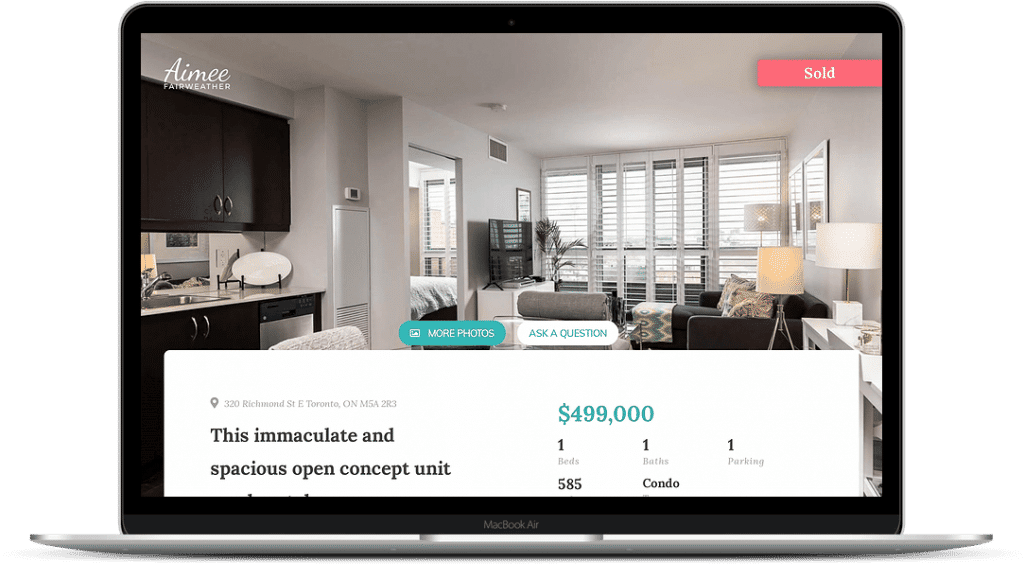
A dedicated landing page for your home
This is so important. Rather than relying on external websites only to showcase your property, we are able to leverage the power of website analytics to gauge the success of marketing campaigns. Allowing us to adjust along the way, or double down on what’s working.
Mobile search optimization
93% of buyers looking for homes use the internet to search. 73% of those people are using a mobile or tablet device. Your strategy needs to incorporate these statistics. We always think “mobile first” when it comes to our online campaigns. The world is after all in our pocket.

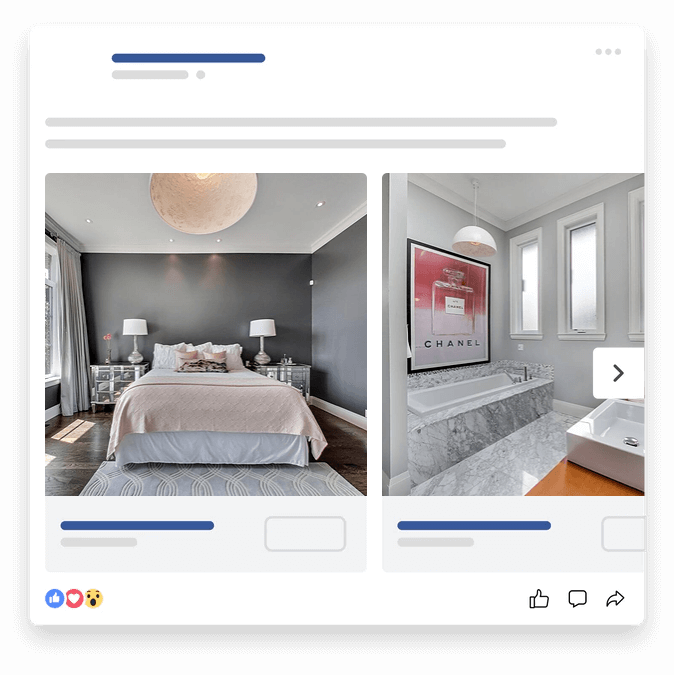

Pay-per-click Advertising
Google, Facebook, Instagram, Pinterest, LinkedIn. All of these platforms allow you to pay for people’s attention and clicks. By finding where our target market is hanging out, we are able to show them a specific message, that speaks to their desires and needs. All of this is tracked through your custom landing page.
More than Local Exposure
The marketplace doesn’t stop at local exposure — your realtor should have a strategy to garner national and international exposure as well. Here at Sage, we market our listings on over 130+ home search portals, in 15+ languages over 6 continents and 70 countries.

Video/Virtual Tours
Buyers may not be able to visit your property because of distance, weather or time constraints. We need to give everyone the opportunity to see your home in the most convenient way possible. In person showings is no doubt the goal, but videos and virtual tours allow us to reach a larger audience.
Professional Design
Whether it is feature sheets, a “For Sale” sign, or “Just listed” postcards — it all needs to look professional and modern. Our dedicated staff of design experts at Sage craft these to perfection to make your home scream quality.
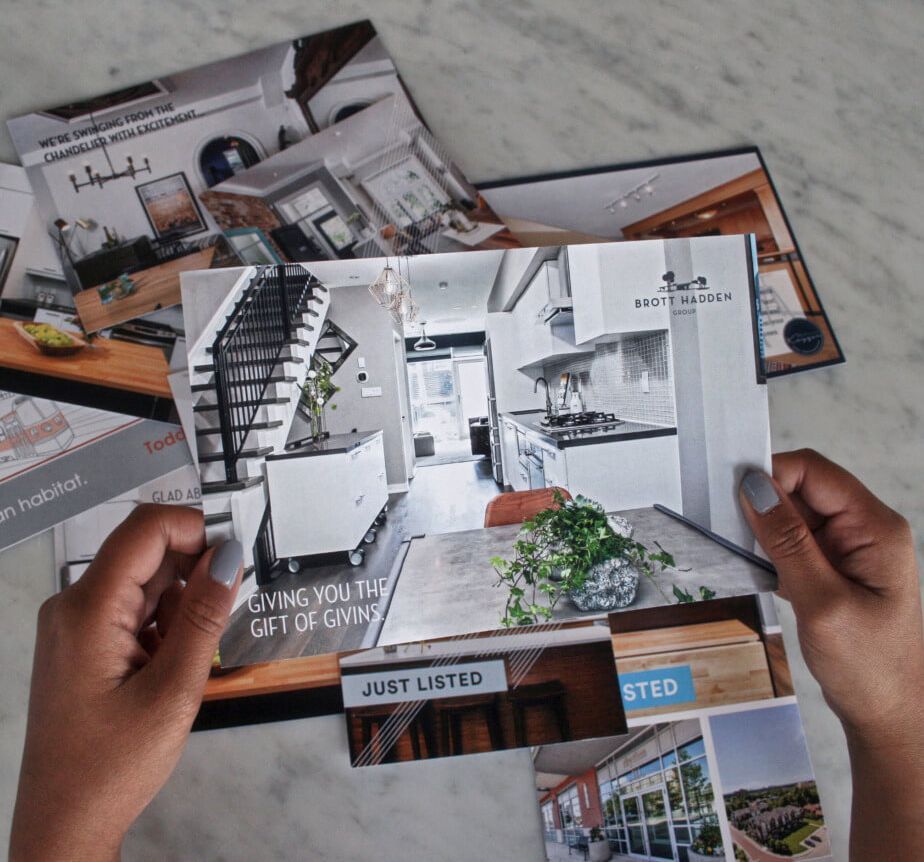
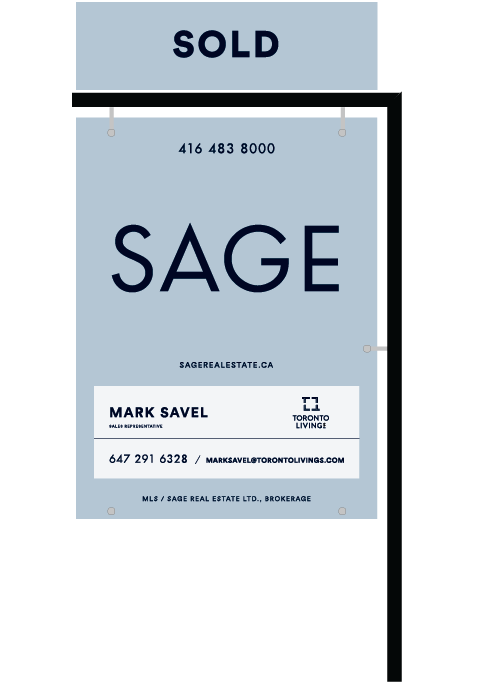
For Sale Sign
We don’t use your property to market ourselves. You won’t find a picture of me anywhere. We use a clean modern design, with a simple way to contact us about the listing. Oh, and we also add a special URL to your landing page/website so we can gain interest from foot traffic.
Email Campaigns to Realtors
We send out an email blast to our large network of local Realtors who may have buyers interested in your property.
Using these and other more traditional strategies like putting your listing on MLS, hosting Open Houses and creating print ads — we drive massive exposure for your listing.
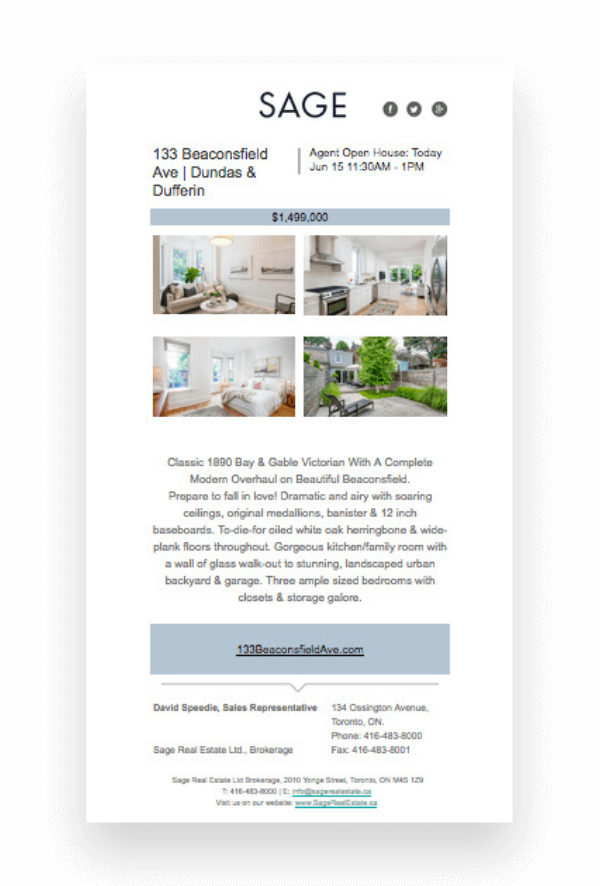
Demographics Are Key
Using all of these tools and marketing strategies definitely gains exposure. But the difference between a good campaign and a great campaign is knowing who your target market is.
The type (condo, townhome, detached, semi-detached, etc.), size or location of your property will all influence who will want to buy your home. It is our job as Realtors to figure that out and market accordingly.
A newlywed couple and a married couple in their 50’s with two kids are going to have massively different wants and needs. Our marketing needs to take that into consideration.
EXAMPLE
81% of the total buyer market favour single-family detached homes. That means you can pretty much target the entire market.
But your advertising copy should reflect the pain points of individual demographics.
Newlyweds
“Start your new life together in this beautiful detached home in the heart of Toronto…”
Married Couple 2 Kids
“This 3 bedroom detached home is large enough for the whole family with 2 highschools within a 10 minute walk….”
Ok, admittedly not the best copy, but you get the idea.
With digital advertising technology on Facebook, Instagram and Google today, you can target different messages to different age groups, genders, ethnicities and family structures and speak directly to their desires. So why wouldn’t you?
ANOTHER EXAMPLE
Baby boomer’s (54-73) are more likely to want Condos than other generations. Maybe due to lower maintenance, lifestyle changes or major life events like children leaving home.
If you are selling a large condo, you definitely want to make sure you are calling out to this specific buyer group and speak to their personal situation.
I work with our in-house digital marketing team to build unique buyer personas for each of our listings. We use these to craft specific copy to call out to each demographic that we are targeting.
Here are some examples of buyer groups we might target depending on which ones will find our listing most desireable:
- Young Family
- Downsizer
- Divorced Parent
- Single Male or Female
- Young Executive Couple
- First Time Buyer
- Investor Older family
- Work relocation
- Newlyweds
- Overseas investor
By writing Ad Copy with our target buyer groups in mind, we are able deliver the right message, to the right people, at the right time and place.
Key Takeaways:
- Make sure your Realtor has a comprehensive marketing strategy. Make sure when interviewing realtors that they can explain how they are going to generate buyer interest.
- Focus on digital advertising. Buyers are shopping online.
- Targeted marketing. Deliver relevant messaging to specific buyer groups.
If you have a marketing plan in place like that which I have laid out in this chapter, you will get a lot of interested buyers knocking on your door.
Now that our marketing campaign is in full swing, in the next chapter we will discuss putting your home on the market.
Chapter 7
Hitting
The Market
By this point you should have already selected a Realtor that will guide and represent you through the sale of your home. Preparations for your home will be well under way, timing and price have been established and you are close to ready to list your home.
The next step is to prepare the copious amount of paperwork required to bring your home to market. But since you hired a capable Realtor, they will take care of all this.
The main thing that your Realtor will need from you is to have you sign a Listing Agreement.
This document gives the Realtor’s brokerage the authority to sell your home. There are two main categories of listing agreements — Exclusive and MLS.
Exclusive Listings
With an exclusive listing, a brokerage lists the property for sale and provides access to a limited number of brokerages.
Only the brokerages that have access to the exclusive listings are able to show clients the property and bring offers.
Exclusive listings get less exposure as they are not placed on the MLS database for all Realtors to see.
This type of agreement is sometimes chosen because a seller wants the selling process to be more discrete.
More often this type of listing is used as way to generate pre-market interest with select local realtors on their exclusive network before it hits the broader MLS system.
It also allows your realtor to do “Coming Soon” marketing for your home to generate interest before it hits the public market.
MLS Listing
This type of listing agreement is more common. Your listing will be uploaded to the Toronto Real Estate Board’s (TREB) MLS system which all TREB realtors have access to.
MLS Listings provide the largest local exposure to realtors and their buyers.
Regardless of the type, after signing the listing agreement, your real estate agent and brokerage will now have binding legal obligations to fulfill. The most important being…
- Your Realtor becomes a fiduciary (working only in your best interest). They must do everything possible to do the best for you, though I hope you felt they would do so without this legal document.
- Your Realtor must fully disclose any information they become aware of related to the sale of your home — that includes presenting any and all offers from prospective buyers. Your realtor and their brokerage are obliged to treat all prospective buyers equally and fairly.
This type of agreement is sometimes chosen because a seller wants the selling process to be more discrete.
More often this type of listing is used as way to generate pre-market interest with select local realtors on their exclusive network before it hits the broader MLS system.
It also allows your realtor to do “Coming Soon” marketing for your home to generate interest before it hits the public market.
Let the Showings Begin!
Now that all the paperwork is out of the way, you are live on the market, and your marketing campaign is bringing in the buyers…
You need to get out of the way!
I am only half joking here. 🙂
The goal of showing the property is to make it as convenient as possible for buyers. Here are a few quick tips to make them want to see your home and stay for longer.
- Move out —If it is possible for you to move out of your house for a week or two to cram in as many showings as possible, do it. That way you won’t have to constantly be tidying up and you will get more buyers through the doors.
- If you can’t move out —make showing times as flexible as possible.If buyers can’t even get in to see a house, do you really think it is likely they will make an offer?
- Tidy up — If you are staying in your home, clean up before every showing before you leave the house. This includes your kids rooms!
- Make sure it smells good — open windows to air it out before showings (weather permitting). Don’t use sprays or air fresheners because some people are allergic.
- Leave the lights on —your Realtor should be able to give you advice on which ones you should leave on at what time of day.
- Keep the temperature comfortable — show off that your AC works in the summer, and keep the house warm in the winter.
- Clean your swimming pool — hot tub and surrounding areas. Make people just want to jump in!
- Open the curtains/blinds — that let in natural light or show off a view, and close any that detract from the properties desirability.
- Hide or remove your valuables — though we would love to trust everyone, the fact of the matter is there are some people out there that could take things.
- Change your security alarm code — before the house goes to market, and after it is off the market.
- Get out of the house for showings — it is hard for people to speak openly to their Realtor if they feel like you might overhear. They need to be openly to their Realtor if they feel like you might overhear. They need to be openly communicate with their Realtor so that they can inform your Realtor of any concerns.
- Make yourself scarce — if you can’t leave the house for some reason do not try and be their “tour guide”. It might make you seem desperate and affect the sale.
- Remove your pets from the home — a lot of people have allergies, and some have fears of certain types of animals. This also helps with tip #2 and #3.
- Remove peanut related food and products — people will open your pantry and cupboards. More and more people are developing peanut allergies these days. No nasty surprises!
Key Takeaways:
- Sign a listing agreement. Discuss with your realtor which type will be best for your needs and marketing plan.
- Make showings easy for buyers. Check over the list above before showings commence.
At this point the offers should be rolling in!
In the next chapter we will learn all about offers types, conditions to look out for, and negotiations.
Chapter 8
All About Offers
Negotiation, just like pricing, is a skill that is honed with experience and education. Some realtors will be better than others. Talented negotiators are worth their weight in gold.
Good negotiation takes objectivity, experience, professionalism and setting ones ego aside. When sellers think of negotiation, they usually fixate on price. But there are other very important factors of an offer to negotiate on which I will go over in this chapter.
Negotiating the Offer
There are really 3 decisions a seller can make when any offer comes in
- Accept
- Decline
- Counter
Your realtor should explain each aspect of the offer that need consideration before they present them to you.
Leaning on your realtor’s experience and abilities, they will be able to advise you about which offers are in your best interest to accept, decline or counter.
SCENARIO
- Buyer A has the highest offer at $800,000 with a condition on financing
- Buyer B has the 2nd highest offer at $785,000 with no conditions
- Should you accept Buyer A or Buyer B’s offer?
- Should you counteroffer?
- Who do you counteroffer?
- Can we get Buyer A to waive their finance condition?
- Or will it be easier to get Buyer B to come up in price?
There are tough questions, decisions and conversations to be had during any real estate negotiation.
You need to trust your realtors ability. Know that they will guide you towards the offers you should be working with, and the correct actions to take with each. They will then do everything in their power to make it happen.
Elements of an Offer to Consider
Though price will probably end up being the main driving force to the majority of real estate transactions, there are a lot of other factors that can be negotiated on.
Some of these elements are the difference between which offer you will ultimately accept.
Price
As mentioned in Chapter 4, your realtor's knowledge of your homes fair market value is of utmost importance.
Depending on the number of offers, they will be able to advise you if you are unlikely to attain a higher price and accept, if they think you are in a position to sign a counter offer, or if you should decline the offer out of the gate.
Closing/Completion Date
This is the date that ownership changes hands. This can be a very important factor to negotiate depending on your situation.
If you are buying after you sell, you will want to give yourself enough time to find the right property.
If you have already purchased and need the funds from the sale before your new home closes, you will most likely want an earlier closing date.
Mortgage Condition
Some buyers will be pre-qualified by their mortgage lender for a loan. Often, the bank will require a property appraisal after purchase to secure the loan. To make their offer more attractive, some buyers will waive this condition knowing they can secure financing.
Others may not have been pre-qualified and need this condition to protect themselves.
Assuming the offer is conditional on securing financing (depending on the wording of that said condition), and the buyers financing falls through, they will have the opportunity to terminate the transaction leaving you with you home unsold.
Home Inspection Condition
Offers conditional on a home inspection allow buyers a few days to have the property inspected by a licensed home inspector. They will help identify structural and material problems to point out potential repairs.
If any major issues are uncovered, the buyer might attempt to negotiate amendments to the original contract. What will be fixed and who will pay for it?
Depending on how the condition is worded in the accepted offer, the buyer may be able to terminate the transaction if the inspector finds something they don’t like.
Deposit
There is no required amount to put down as a deposit in Ontario. That being said, many offers in Toronto these days are made with quite large deposits. 5% of the purchase price is usually seen as a “good” deposit.
The deposit is used as an indicator of the Buyers commitment to closing the deal. It will be held in trust by your listing brokerage until the closing date, when it will be credited to the buyers down payment.
Buyer Commitment
Your realtor will evaluate and discuss with you whether they feel that the buyer submitting the offer will be able to close on the transaction.
They will consider the size of the deposit, number of conditions, offer price and anything they can find out from the buyers realtor.
Receiving Offers
Though price will probably end up being the main driving force to the majority of real estate transactions, there are a lot of other factors that can be negotiated on.
Some of these elements are the difference between which offer you will ultimately accept.
When listing your home, your realtor will advise on the best strategy for receiving offers that will net you the highest sale price.
There are 2 main methods.
1) Holdback on Offers
In lamens terms, a hold back on offers is when you list your home with offer instructions explaining that you will not be reviewing offers for several days.
You will host an offer night where all buyers can submit their offers for your review.
The purpose is to receive multiple competing offers on offer night.
This has been a popular strategy for sellers in Toronto over the last several years.
2) No Holdback on Offers
Basically the opposite of a holdback, this strategy explains to the public that you will be receiving and reviewing offers at any time.
Types of Offers: Multiple Offers
When two or more buyers offer on the same property, you are in a multiple offer scenario.
Also sometimes referred to as a bidding war.
This is the ideal situation for any seller in the Toronto market, and will greatly increase your odds of getting top market value — and as I have often seen over the last few years — over market value.
Though you are likely to do well in any multiple situation, some realtors are better at leveraging them.
How Do You Get Multiple Offers?
Obtaining multiple offers requires timing, the right strategy and knowledge of the current market conditions. Some realtors are better at this than others.
- Should we host an offer night, or take offers any time?
- Are we giving buyers enough time to see the home before offer night?
- Are there other competing properties on the market that may split your buyer pool?
- Are there major holidays or long weekends that could affect turnout?
- What is the long-term weather forecast (yes, this matters)?
If you have taken in the advice laid out in this guide, you will already be well on your way to having multiple buyers wanting to offer on your home.
8 Things You Can Do to Get the Most Out of Multiple Offers
- Educate yourself on the market. Do all the homework your realtor gives you and research on your own. This will help your decision making when working with offers.
- Make yourself fully available on offer night. You need to be able to sign documents within short timeframes.
- Carefully consider offers. Don’t focus just on price. Remember to look at everything we talked about in the previous section.
- Know your ideal closing date.
- Look for offers with no conditions. If the price offered is close — a deal without conditions can be more valuable as it is firm and binding once you sign on the dotted line.
- Have your home inspected. Buyers may have paid to have multiple homes inspected by the time they offer on yours. It shows confidence in the state of your home and may bring more offers without conditions.
- Make decisions with confidence.
- Don’t celebrate until the deal is closed (see Chapter 9)
There are a number of other items to consider, but your realtor will advise you on them when the time comes.
If you don’t trust your realtor by the time you are in multiple offers, you are in a bad spot. I can’t help you there.
The right realtor can net you tens to hundreds of thousands extra in a multiple offer scenario.
Choose wisely…
Types of Offers: Bully Offers
Bully offers or pre-emptive offers occur when a seller has chosen to use a no holdback on offers strategy and set an offer night.
They are hoping for a multiple offer scenario.
But just because the seller and their realtor have chosen that they will have an offer date, does not mean that there are any laws preventing a buyer from submitting an offer before the scheduled time and date.
If they go ahead and submit an offer anyway, it is a bully offer.
A seller is allowed to ignore a bully offer. In fact, in some cases, they may choose not to even look at them.
That being said, the listing agent must always inform the seller that the offer has been registered. It is up to the seller if they want to look at it or not.
Verbal Offers
Rather than submitting a bully offer in writing or registering it, a buyer’s agent may contact the seller’s realtor with a verbal offer. Focusing on the price they are thinking of offering.
Submitting an offer does involve paperwork. So if they can find out that the seller may not even look at a bully offer at the price in question, they may be better off not submitting it.
Deciding on Your Course of Action
The decision to entertain a bully offer will be different with every property. There are too many aspects to consider unique to each sale.
Usually the most important factor is the price of the offer.
Do you think there is a good chance you will get more than the bully offer in hand on the offer date?
This is the difficulty with bully offers, because they tend to come in quite strong, otherwise there would be no point. To answer this question you need to consider:
- How many showings have there been?
- Are there many more appointments scheduled?
- Have buyers or their Realtors communicated that they have interest in the property? How many?
- What is your immediate reaction to the offer price? What does your Realtor think?
- When is the expiry of the bully offer?
- Do you think the buyer will try again on offer night if you turn them down now?
It all comes down to risk/reward.
By accepting a bully offer, you will never know what you may have received on offer night. This could be seen as a good thing because what we don’t know can’t hurt us. Right?
On offer night you might get less money and have huge regrets about not taking the offer. There is just no way to know.
Rely on Your Realtor
You need to trust that they understand the market conditions and factors surrounding any bully offer. They will do their best to advise you on the course of action that will net you the highest price.
If in the end you decide to review the bully offer, your Realtor will have a process for informing other buyers that have expressed interest that there is an offer registered.
You might even have another buyer at this point submit their own bully offer and you could find yourself in multiples anyway!
What If Your Property Won’t Sell?
There will no doubt be many emotions running through your head if your house is sitting on the market for weeks or months, with little to no interest.
Stress, frustration, anger.
You can’t let these emotions get the better of you. The issue can be rectified but you need to be willing and open to take the actions necessary to turn it around.
Possible Culprits
- Priced too high (probably the #1 reason)
- Listing details, description and photos are lacking or poor
- Online marketing is ineffective or non-existent
- Competition in the marketplace
- Decor is dated
- Buyers concerns have not been addressed
- Structural or material repairs are needed
- Restrictive showing times
- The Realtor
One of these things needs to change. It is no doubt that the current Toronto real estate market is a sellers market.
You should be able to sell your home if that is truly what you want, but it may take reigning in your expectations.
Key Takeaways:
- Carefully consider all elements of offers. Price is not the only factor.
- Aim for multiple offers. Hosting offer nights is usually your best bet.
- Listen to your realtor. They are always acting in your best interest.
- Make the tough decisions. If your home won’t sell, you need to be open to changing things up.
We made it! If you have followed the advice in this guide, and have taken the guidance of your expert realtor, you should have at least a few offers on your property.
Once you accept an offer, there are still a few more hurdles to get through before you can pop the champagne…
In the next and final chapter, I will show you what it takes to get an offer from accepted to closed.
Chapter 9
After
Accepting The Offer
An offer being accepted is not the end of the road. If there are conditions in the offer, these must first be met before a deal is firm and binding.
Getting from Offer Acceptance to Close
The two most common conditions that prevent a sale from closing are a condition on home inspection and a condition on financing.
Appraiser Visit
As mentioned in Chapter 7, if the buyer is taking out a mortgage on the property, an appraiser could be visiting the property in the next few days to ensure the price paid for the property is realistic.
If the contract is not conditional on financing, the appraised value will not affect you.
If it is conditional, and the appraised value is less than what the property was sold for, or the mortgage cannot be secured, the buyer will be able to walk away from the transaction (depending on the wording of the condition).
Remember, don’t celebrate too early, especially when conditions are involved.
Amendments
It is possible that amendments to the original Agreement of Purchase and Sale need to be made.
Both the buyers and sellers may want to make changes.
Buyer Amendments
For example, the accepted offer had a condition on home inspection. The inspection revealed a major repair that is required.
The buyer may still want to go ahead with the contract, but may want changes made to the sale price to account for the cost of the repairs.
If the seller won’t accomodate the changes to the contract, the buyer may opt to terminate the contract.
Seller Amendments
Seller’s may want to make changes as well. Maybe they thought of an item in the home that they would like to keep that were overlooked in the original contract.
- Drapes
- Mirrors
- A chandelier
- etc.
Or they could want to adjust the closing date to align with the purchase of their new home.
Finalizing the Sale
The Agreement of Purchase and Sale is finalized once
- The deposit cheque has been deposited into the seller brokerages trust account.
- All conditions in the offer have been met and fulfilled
At this point MLS will be notified that the property has sold, and you can finally put a Sold sign on the lawn.
And finally…
Pop that champagne!
Buyer Visits
In all likelihood, the contract will contain terms for the buyer to be able to visit the property a few times before they take possession. They will be booked in advance at times you and the buyer agree upon.
This will allow them to measure the space, meet with contractors and decorators for quotes and make plans for after the closing date.
Preparing to Move
Sage has been kind enough to put together a comprehensive 103-point moving checklist.
If you need recommendations on movers, don’t hesitate to reach out.

Get the 103-Point Moving Checklist!
Eliminate the disorganization and anxiety...
- Stay on top of everything and everyone during your move
- Tonnes of tips for packing, storage and prep
Reflecting on Your Experience
While we as realtors rely on different marketing tactics to grow our business and get the word out, we know that delivering a stellar client experience is the lifeblood of our business.
We can’t improve without feedback from our clients.
And we can’t show that world what we can do without your reviews and referrals.
If your realtor and their brokerage went above and beyond, and exceeded expectations your kind words will let them know they are on the right track.
Put it in the extra effort and post them on Google, Yelp or Zillow. Help other people find them so that they can continue to provide exceptional service to others who need it.
If you weren’t happy with their services, rather than writing a bad review, why not let them know personally and provide constructive criticism? This will help them improve the next time and learn and grow like we all deserve to.
Ready to Buy
If you haven’t purchased already and are thinking of doing so, I implore you to check out my Ultimate Home Buyer’s Guide. If you found any value in this one, I am sure that it can help you with the purchase of your next home.
Conclusion
I hope that you were able to find some valuable nuggets in the Ultimate Home Sellers Guide.
If there are topics you would like me to ellaborate on or add, please reach out and let me know!
Whether you are thinking of selling soon, or years from now, I would be happy to offer advice and guidance along the way.
Remember, you can never start preparing too early.
Good luck and best wishes.

About the Author
Aimee Fairweather
Hi, I’m Aimee — a Toronto Realtor with a passion for everyday people navigate the Toronto Real Estate market.
I believe an educated homeowner has a better chance of maximizing their home sale value, which is why I put together this comprehensive guide. I hope it can help you in some small way.
